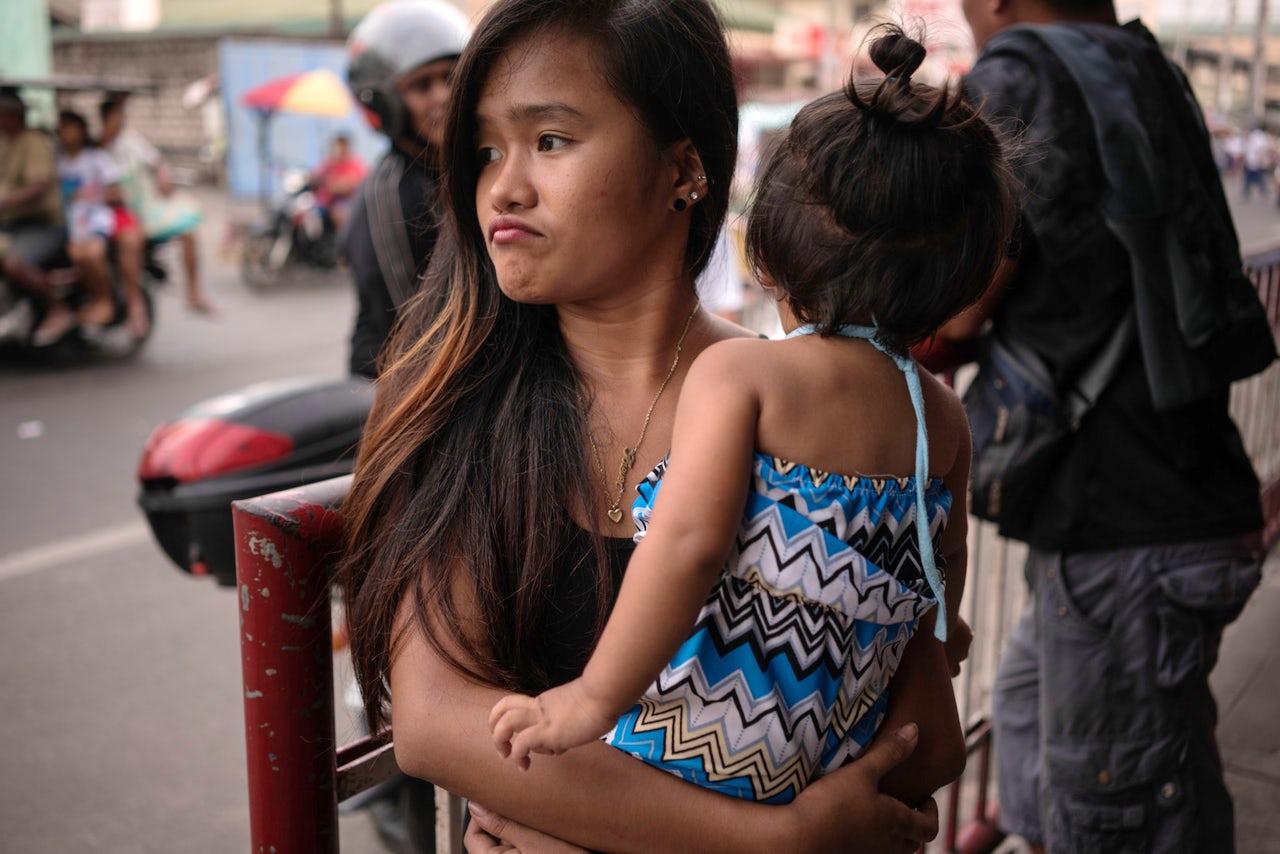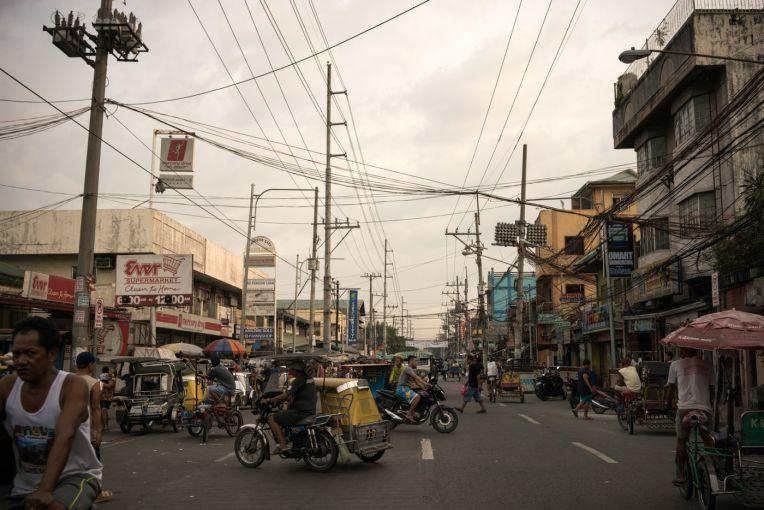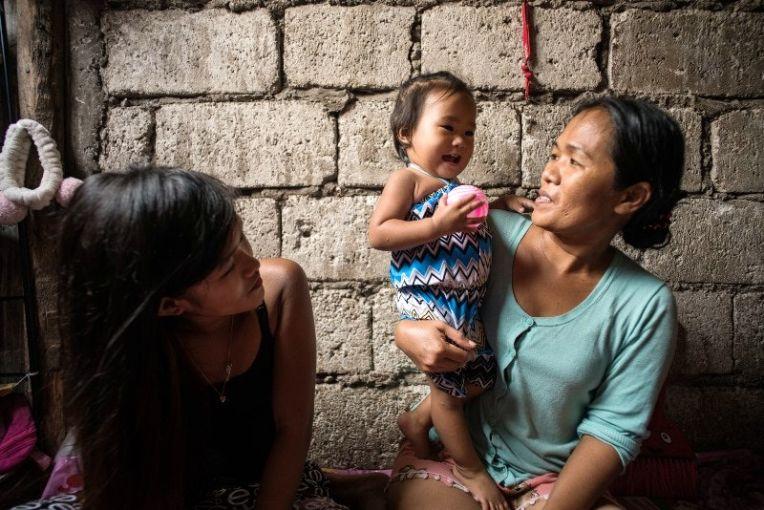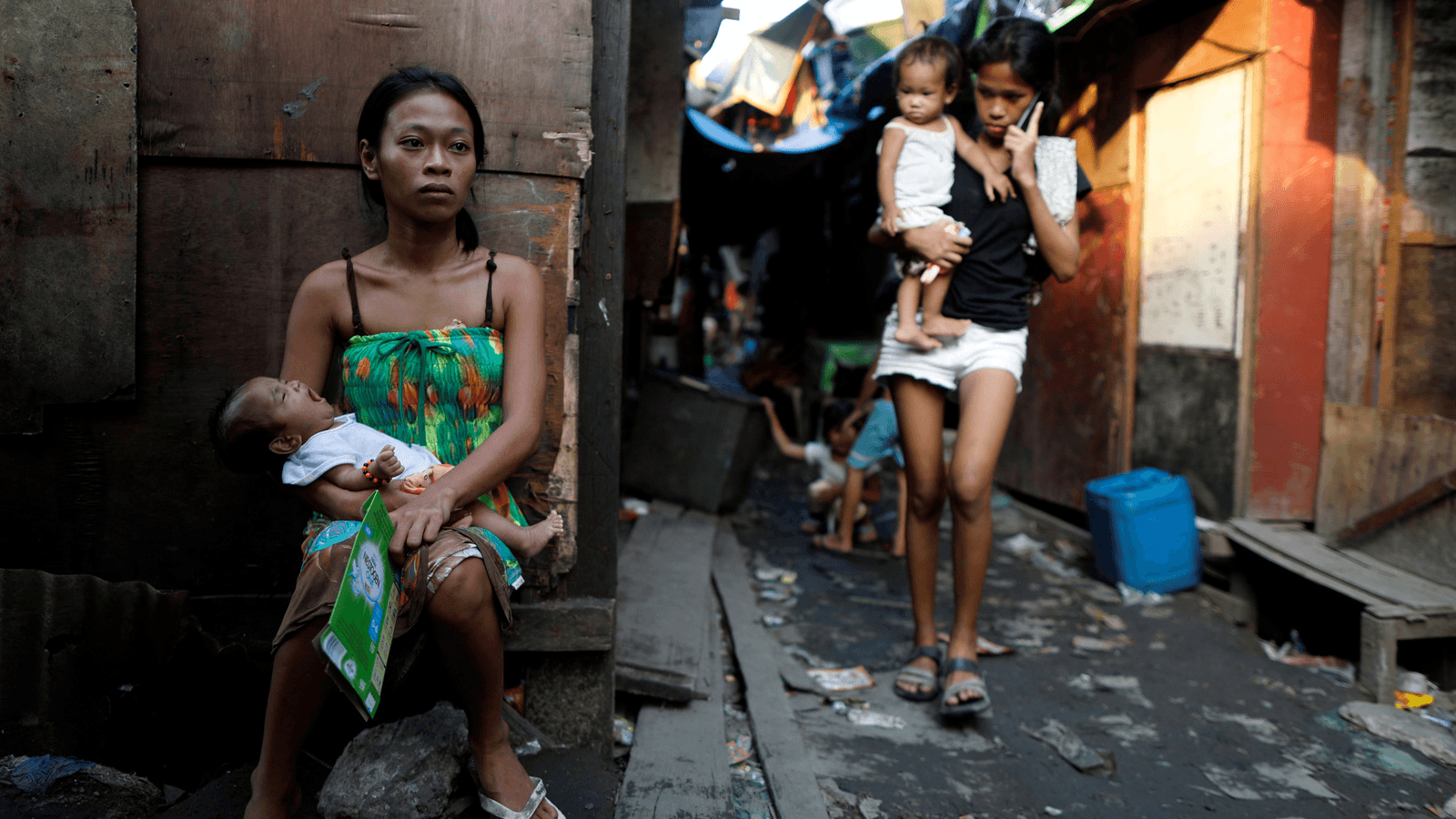Teen ‘widows’ of Duterte’s drug war face a bleak economic future
Residents are seen outside their shanties in Navotas, Metro Manila, Philippines, where Jazmine Durana lives, Oct. 28, 2017.
It was just after midnight when four men in black masks broke down Jazmine Durana’s door.
Two of them held Durana and her baby at gunpoint, ordering them to stay inside. The other two dragged her boyfriend, Toto dela Cruz, outside.
Earlier that day, a theft had been reported in the Navotas fishing port where dela Cruz worked as a fisherman, the men said. Durana heard them accuse dela Cruz of stealing and using drugs. Then she heard the thud of fists pounding flesh, and cries of pain.
The men pumped four bullets into dela Cruz: one in his mouth, two in his head and one to his chest.
Dela Cruz and Durana’s baby, Hazel, was just one month old. Her parents were both 16.
Related: These women in the Philippines scour a dump site for trash to turn into ‘something beautiful’
Sitting in her own parents’ house months later, Durana struggles to pacify Hazel, who is bouncing on her lap. Now a year old, the baby is determined to examine every new object she comes across by tasting it. Durana yanks a translucent orange lighter from Hazel’s mouth and the child begins to wail in indignant protest. It doesn’t take long for her to find another item of interest — this time, a copper coin.
There are not many toys for Hazel to play with here. There isn’t much of anything in the tiny shanty that Durana shares with her parents, two siblings and her daughter. Thin sheets of wood have been erected as makeshift walls and flattened cardboard serves as a mat on the floor.

Durana’s mother does not work. Her father makes money when an extra pair of hands is needed on a construction site or at the fishing port.
In a country with the highest teen pregnancy rates in the region, Durana is a teen mother. She has lost her co-parent and breadwinner to a state-sanctioned drug war that has claimed the lives of thousands of mostly young men.
Though she was too young to officially marry her boyfriend, Durana is now essentially living as a teen widow. On paper, she is an oxymoron — two words that don’t belong together, forced upon one another. In reality, she is a social anomaly.
Durana personifies what happens when soaring teen pregnancy rates that have defied a global trend of decline collide with a growing body count of mostly young men slain in drug-related killings.
Duterte’s drug war
In 2016, the votes of 16 million people and an audacious promise to end crime and illegal drug use in six months transported Governor Rodrigo Duterte from his hometown of Davao, in the southern Philippines, to the presidential palace.
His rhetoric, defined by profanity and threats against criminals and people who use drugs, indicated that a war on drugs was the solution to all of the country’s problems.
The killings started as soon as Duterte took office. Corpses were dumped under bridges and in dark corners, their faces strapped with packaging tape and cardboard signs around their necks labeling them as drug pushers. People were shot dead in the street by masked men on motorcycles.
Usually, the victim was a man or boy whose name had appeared on a neighborhood watch list of drug users, or who had surrendered to authorities when Duterte came into power.

Navotas, where Durana had lived with dela Cruz and his parents, is a known hotspot for drugs. Located 7 miles away from the Philippine capital of Manila, Navotas is home to the country’s largest fishing port. On the boats, some men use methamphetamine (locally known as shabu) to stay awake during the days that bleed into nights fishing at sea. At the port, they use shabu to keep fatigue from setting in as they plow through 24-hour shifts, hauling pail after pail of fish from docked boats to waiting trucks.
Now, Navotas and its neighboring city, Caloocan, have become known as killing fields.
Intersections of tragedy
Durana is a single mother with a baby to raise, but she is also still a minor and cannot access two things she desperately needs: a job and birth control. Because she is a minor, it’s extremely difficult for her to find either.
“Jazmine is the intersectionality of our many problems in public health and welfare, security and social justice. It is an indication of our many failures as a society,” said Perci Cendana, former commissioner of the National Youth Commission, a government agency that lobbies for youth-friendly legislation.
Related: Inside the Philippines’ women-run crime ring selling abortion elixirs
Globally, teen pregnancy rates have been on the decline. However, the Philippines has consistently bucked this trend and has one of the highest rates in the Asia-Pacific region.
A reproductive health law that promises universal access to contraception requires minors to present parental consent before accessing free birth control services at government-run hospitals and clinics, meaning many teenagers miss out — even those who have children already. Every day, more than 500 babies are born to Filipino teenagers.
Finding a job has been difficult for Durana. She has tried to work as a dishwasher and street vendor but has been politely asked to leave after her employers got nervous about employing a minor. She says being less than 5ft tall and about 80lb doesn’t help; people think she is younger than her 17 years.
“Getting a job as a minor is difficult because this could cross the line of child labor,” explained Senator Risa Hontiveros, who is the chairperson of the Senate Committee on Women, Children, Family Relations and Gender Equality.
Hontiveros has long been critical of the Duterte administration’s war on drugs, saying that the approach has been “wrong from the beginning.”
Durana is left dependent on her parents and dela Cruz’s parents for support. She says she tried going to weekend classes so she could finish high school, but with Hazel getting sick quite often, she has not been able to attend classes regularly.
A 2016 study by health economist Alejandro Herrin for the U.N. Population Fund estimates that a teenager who gets pregnant, and who is hence not likely to finish high school, could miss out on up to 83,000 Philippine pesos ($1,660) a year in earnings. The same study calculated a loss of 33 billion pesos ($640 million) — about 1.1 percent of the Philippines’ GDP — to the economy as a result of early pregnancy.
News Deeply spoke to two other young women whose live-in boyfriends have been killed in the drug war and have found themselves in the same predicament.
Mishel Ordillos’ boyfriend, Hideyoshi Kawata, was killed in January last year in a police operation that was supposedly meant to arrest his stepfather, who had been renting out their home as a drug den. Kawata was 17, and left behind Ordillos and their baby, Hyree, who is 8 months old. Hyree was born with congenital heart disease and may need an operation.
Like Durana, juggling childcare, schoolwork and trying to find a job has been near-impossible for Ordillos, who turned 18 last November. “I just need a job, any job. As long as I can work and have money for Hyree’s tests and hospital bills,” she said.
“I just want her to finish school so she can find a job. Any job will do. I don’t have big ambitious dreams for my children,” Ordillos’ mother, Eleanore, said.
Related: The Catholic Church defies Philippine President Duterte
Kawata’s family filed a complaint against 13 Caloocan police officers involved in the police operations that resulted in his death.
The Commission on Human Rights released a resolution in June 2017 finding 13 Caloocan police officers guilty of human rights violations in the case of Kawata’s death, and recommending the case be referred for criminal charges.
Another teen “widow,” Jocelyn had run away from her violent stepfather when she was 13. The streets became home and she took up sex work at a local bar.
She was pregnant by a client when she met her 32-year-old boyfriend, Alan. She knew he was dealing drugs, but he got her off the streets and looked after her.
Alan was killed by masked assailants one night when he went out for a beer. After losing her breadwinner, Jocelyn went back to sex work and gave her baby, whom she has not named, to her mother.
“I was pregnant with another man’s baby and he took me in and took care of me. No one ever loved me like he did. They took him away from me,” Jocelyn, who did not want to use her last name, said.
A heavy toll on women and girls
Government data from January 2016 to January 2018 indicates that 3,968 people have been killed in drug-related operations in the Philippines. Human rights advocates say the body count could be as high as 12,000–13,000.
There are no figures to account for the single mothers left behind.

Father Joselito Sarabia is part of Rise Up, a church group that provides support to families in cases of extrajudicial killings. He said these girls need a new livelihood above all else.
“They were already very poor before this. The death of the breadwinner sends them spiraling deeper and deeper into poverty,” Sarabia said.
In March last year, the Commission on Human Rights, together with rights groups and civil society organizations, held a forum with victims’ families to better understand the effects of the drug war on women and children.
Many of the respondents said they felt at a loss. They don’t know who to go to or where to go, or even what kind of help they need beyond the immediate financial obligation to pay for funeral expenses.
Respondents also reported a lack of institutional support. Churches, civil society organizations and legal groups are coming together to help communities, but these are mostly run by volunteers at the community level — there is no centralized or government assistance.
“The war on drugs exacts a heavy toll on women. There should be psychological intervention on top of economic support,” Senator Hontiveros said.
“The war on drugs is a state-sanctioned program. There is little thought given to the unintended victims of the campaign.
“After the war, on the familial level, it is the women who pick up the pieces.”
Ana Santos reported from Manila, Philippines. Reporting for this story was supported by the Pulitzer Center on Crisis Reporting.
This article originally appeared on Women's Advancement Deeply. You can find the original here. For important news about women’s economic advancement, you can sign up to the Women's Advancement email list.
Our coverage reaches millions each week, but only a small fraction of listeners contribute to sustain our program. We still need 224 more people to donate $100 or $10/monthly to unlock our $67,000 match. Will you help us get there today?
